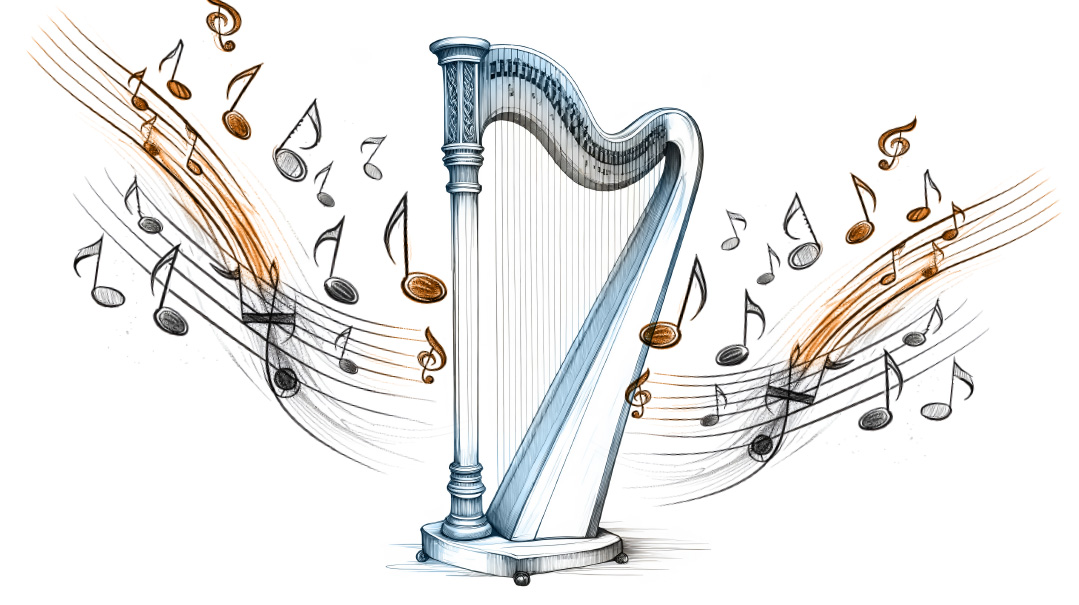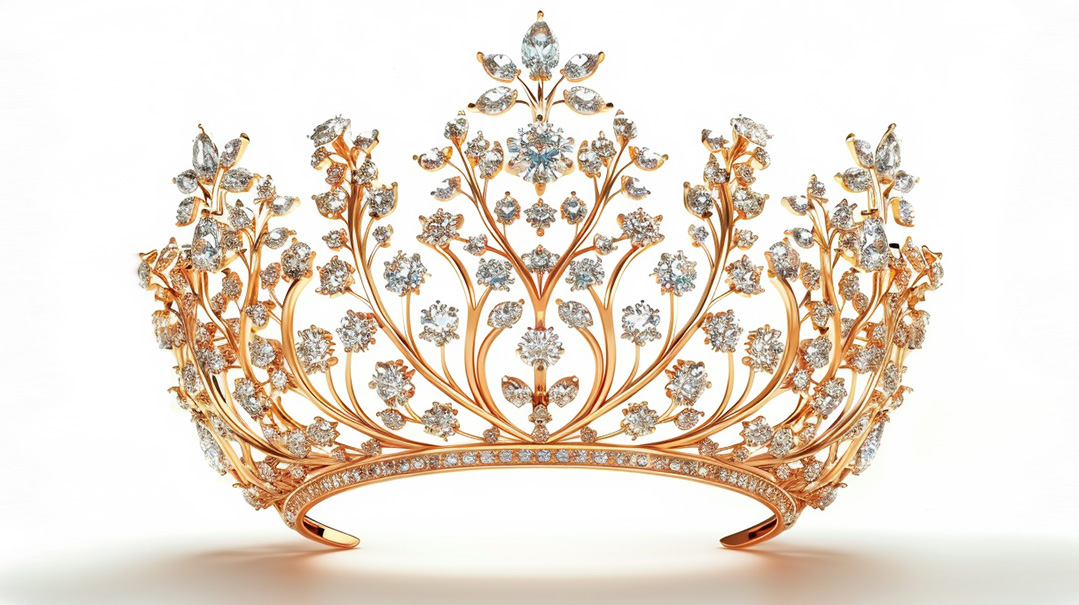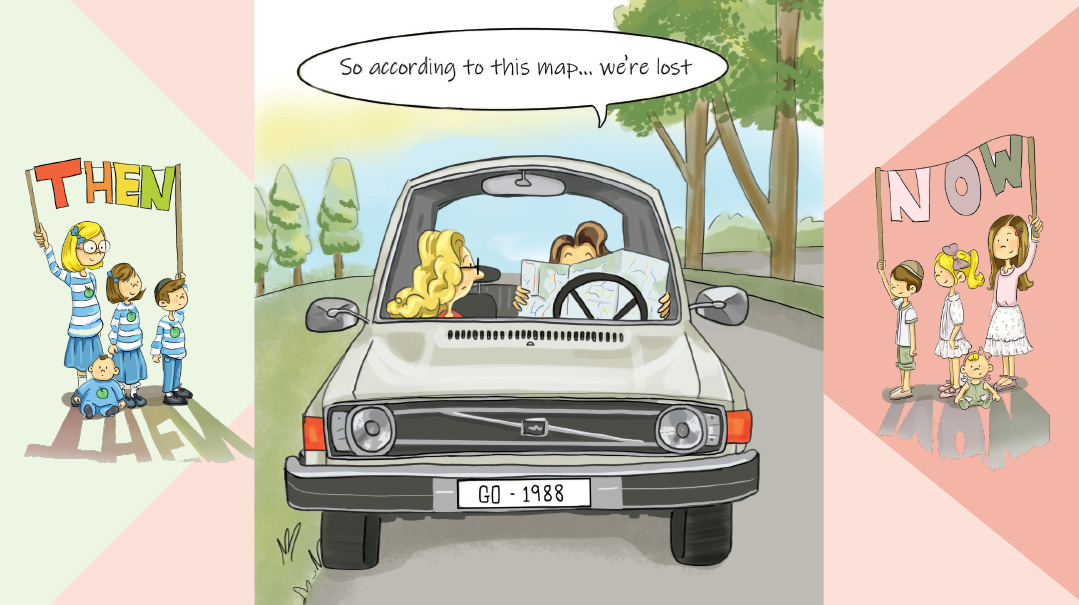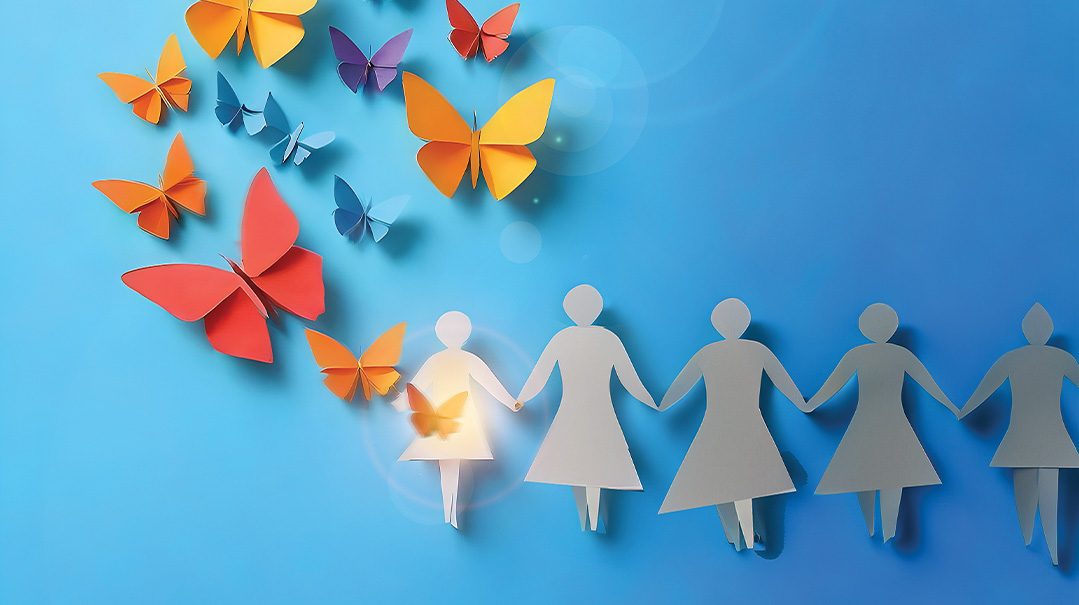The Victorious Tortoises
| February 22, 2022The Kens survived terror and trauma to build a home of endurance and faith

There are thousands of participants in the annual Jerusalem Marathon, but the Ken family from Kiryat Moshe, or “the Victorious Tortoises” as they’ve dubbed themselves, stick out from the crowd. Flanked by his six children and assisted by his wife, Ariella, Eliezer Ken completes the entire marathon on crutches, grateful for every step.
After a terrible car accident left Eliezer with permanent disabilities, he and Ariella were determined to persevere. Today, 18 years later, the beautiful family they’re raising is living proof of the power of endurance and faith.
Miraculous Move
Ariella’s determination to retain positivity and gratefulness where others would see trauma and horror didn’t start only after her husband’s car accident.
Born in the United States, the youngest of four siblings, Ariella was four years old when her family made aliyah and settled in the Jerusalem neighborhood of Romema.
In 2003, Ariella was 25 years old and working as a speech therapist when she experienced what she calls “my personal miracle of when I was saved.” She’d enrolled in a course to learn sign language, and got on the 14 Alef bus headed toward the central part of the city to get to her class.
“I boarded the bus and sat down just behind the four-seater seats,” Ariella remembers. “It was a typical scene in Israel. The bus driver was playing music. A few women were seated saying Tehillim. Some teenagers were being rowdy.
“The bus wasn’t totally full, but the front seats were all taken. At the next stop, I noticed an elderly woman board the bus. I turned around to see if there was a place for her to sit. While there was, and I could have stayed seated, I was brought up in a home in which you knew that when you see an elderly person, you stand up, so I did. I moved myself to the back of the bus, where there were a few empty seats. We passed one stop and then the next. More people got on and more people got off.
“Then there was a blast. The blast wasn’t the bad part. It was the dead silence, the silence of death that followed.”
Ariella was one of the passengers on the 14 Alef bus bombing in 2003, one of Israel’s worst terror attacks, in which 100 people were severely injured and 17 were murdered.
“After those few moments of the worst silence I have ever heard and will ever hear in my life, I opened my eyes and realized that it was a terror attack. I was in a terror attack. I tried to get up, but there were people lying on top of me. Some were alive. Some were not.”
The bus doors opened, and Ariella and a few others were able to help each other get up and off the bus.
“I saw the worst things you could imagine,” she continues. “It was a horrifying scene. Regular people aren’t supposed to see these things. I didn’t know where to put myself in all of the chaos.”
Ariella sat down on the curb and waited for the ambulances to come. She was in need of medical attention, and medics quickly ushered her into an ambulance to transport her to Shaare Zedek Hospital.
“The entire ride to the hospital, the medics were asking me all sorts of questions, but I couldn’t focus on them. I just kept thinking, Hashem, You’re so good to me. Not only did You save me, but it’s so clear why. In the zechut of getting up for the elderly woman, in the zechut of that chesed, You saved me.”
Ariella tried calling her parents but couldn’t get through. She needed surgery, but wanted to wait till they could come be with her. The doctors, burdened with caring for hundreds of injured victims, acquiesced.
When she finally got through to her parents, her mother said, “Oh, Ariella, it’s good you called. There was a pigua [terror attack]. I started to worry.”
“Ima,” she said, “I was in the pigua, but I’m okay. Please come.”
Ariella’s parents rushed to the hospital, and she was taken into surgery. She was discharged after a few days and later returned for surgery on her eardrum. While Ariella was miraculously saved, her mother lost a close friend, Elsa Cohen, in the attack, and the mix of concurrent emotions was hard for the family. But Ariella describes herself as lucky.
“I didn’t have PTSD,” she says. “I didn’t have nightmares. In fact, two weeks later I got on a bus and I was fine. Bituach Leumi invited me to a support group for those who survived terror attacks, but after hearing what people were going through, I didn’t feel like I belonged there. I had a reason why I survived. I saw Hashem’s Hashgachah.
“It wasn’t just that b’zechut getting up for the elderly woman, I survived… it also saved me from being traumatized. It’s one thing to be saved physically, but Hashem also saved me mentally and emotionally. Who wouldn’t be grateful for that?”
The Next Chapter
A few months later, Ariella was working in Aleh, a rehabilitative network that offers comprehensive care to disabled children, when she met Eliezer Ken, a nurse who was also working there. Ariella was in charge of the afternoon program and was impressed with how gentle Eliezer was with the boys in his charge. Soon after, they got married.
But the storybook ending of “terror victim is miraculously unscathed, gets married, and lives happily ever after,” didn’t pan out in a straightforward fashion.
Four weeks after their wedding, Eliezer was waiting at a bus stop when a cab ran a red light, swerved out of control, and struck him. He sustained a serious head injury and was fully unconscious for three weeks.
Ariella, a fresh young kallah, found herself thrown into a world of hospitals, doctors, and gloomy prognoses. She made sure her new husband was never alone, sharing shifts with her in-laws. She admits it was difficult.
“What can I say? It wasn’t easy. I hardly knew my husband’s family, and all of a sudden, we had to figure this out together. It wasn’t natural and it for sure wasn’t a normal shanah rishonah.”
Five weeks after the accident, Eliezer had gradually returned to full consciousness and was ready for rehabilitation, which Ariella refers to as “the chapter we’re still and always will be in.”
Once stable, Eliezer was transferred to Beit Levenstein, a rehabilitative hospital in Raanana. After three months, he began coming home for Shabbos, and after another five months, he was discharged to sleep at home, while still spending every day in the hospital receiving intensive physical, speech, and occupational therapy. Ariella would travel every morning from Jerusalem to Raanana and spend the mornings with her new husband, accompanying him to all of his treatments, while in the afternoons she retained her job as a speech therapist, allowing her some semblance of normalcy.
A trauma of this magnitude could easily have shattered their fresh marriage, and listening to Ariella describe her husband is awe-inspiring.
“I have so much respect for Eliezer,” she says. “He is truly a man of emunah peshutah. He just pushes on and thanks Hashem for everything. This is a man who was a commander in the paratroopers, became a nurse, and was spending his days helping disabled children.”
The accident wrenched him from the place of a strong, independent giver to someone, initially at least, dependent on others for all his needs.
“Most people wouldn’t be able to make that switch emotionally,” Ariella continues, “but Eliezer just kept a smile on his face because he truly believes that everything Hashem does is exact and is not just for the good, but the best possible outcome.”
A few years after the accident, Ariella and Eliezer found out that they were expecting.
“To say we were over the moon, wouldn’t really do justice to how happy we were,” Ariella says. “Due to Eliezer’s injuries, we never knew if we would be able to have children. It definitely wasn’t a given.
“Before we had kids, it felt like we were this nebach couple, but once we were expecting, suddenly we were like everyone else — clueless first-time parents. It changed our lives. Becoming parents was a gift in and of itself, but for us it was something extra. It made us normal.”
Always Grateful
Today, the Kens have six beautiful children, ages three to fourteen, who attend the local ulpanot and Talmudei Torah in Kiryat Moshe. Their youngest daughter was born in Adar Beis, in the same week the accident happened 15 years earlier, and in the same hospital. Ariella and Eliezer felt they had come full circle, and they expressed their emotions in the name they chose for their daughter, Hodaya.
“My children have been brought up differently, because they were born into a world in which their father is extremely limited in how he can help them,” Ariella says. “They know how precious life is and how precious every ability they have is. They don’t take anything for granted.
“My kids are involved in all the regular activities kids do — running, playing, drawing, and the like. But they feel grateful that they can do it. In our house it’s normal for a plate to shatter. Eliezer drops things often and falls often because he wants to push himself to do everything he can. My kids don’t get alarmed by these things because it’s always been a part of their lives.” Eliezer tries to give his wife and children everything he can.
“He knows he can’t do a lot of the regular things, so he’s always looking to do the special things for us. If I were to tell him I wanted to go on a vacation, he would tell me to go, without any hesitation. If the kids want to go to something special for Chol Hamoed, he wants it for them even more than they want it for themselves. He wants everyone to be happy.”
Today, Eliezer walks with crutches, and speaks with difficulty. The accident left him with tremors, which effectively curtailed his nursing career. Instead, he decided to become a teacher. He enrolled in college, and in fact has just finished his master’s in education. Through a Ministry of Education program which helps people with disabilities find jobs within the educational system, he found a position teaching Mishnah and Gemara to seventh- and eighth-graders, and uses innovative methods to circumvent his limitations. He teaches using sign language, drawing, and by creating captivating plays for his students.
Incredibly, Eliezer is still laser focused on all the good in his life, and tries to impart this message of gratitude to his students. He often quotes a teaching of Rebbe Nachman that explains that if a person says, “Hashem, You’re so good to me, everything is so good,” then Hashem will say, “This is good? I’ll show you good.”
Ariella agrees. “Look for the chesed,” she says with a smile. “Everything Hashem does is meduyak, it’s exact.” She’s also a big believer in finding the purpose in challenge. “Take what you went through and help another woman,” she says.
The Ken family definitely has a pace of its own, but through genuine simchah, gratitude, and faith, they’ve already achieved more than most can dream of. Ariella Ken survived a horrific terror attack, only to face another monumental challenge soon after she got married. But she and her husband have never let that stop them from building a home filled with gratitude and faith
(Originally featured in Family First, Issue 782)
Oops! We could not locate your form.






